Dorothea Shefer-Vanson's Blog, page 4
February 13, 2025
Joseph and His Brothers
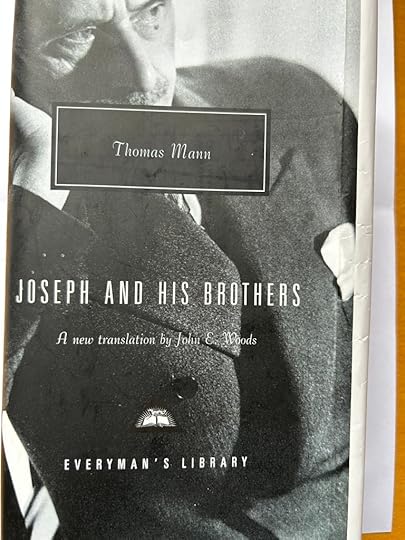
When visitng a friend in the Netherlands he recommended this book and I decided to try and get hold of it. This was not as easy as it sounds, and it was only through a special search feature of the tried and trusted Bibliophile company that I managed to buy it and have it delivered to the hotel in London when I was there a few months ago.
The book itself is large and heavy, comprising almost 1,500 closely-printed pages on extra thin paper and weighing more than one kilogram, so it isn’t easy to hold for long. In addition, because of the closely-printed text, which strains the eyes, it is difficult to read for an extended period of time. Fortunately, each chapter is divided into segments, enabling this reader to take frequent breaks as she proceeds with the task of devouring the formidable text.
Thomas Mann, whose portrait adorns the cover, set himself the monumental task of tackling the stories of the ancestors of the Jewish people and setting them in their wider context, thereby resurrecting them in a way that draws on archeology, history, geography, comparative religions, philosoophy and psychology to portray the events described in a skeletal manner in the Bible.
The book has been expertly translated from German by John E. Woods. As one could expect from a Nobel Prize-laureate of Thomas Mann’s stature (Buddenbrooks, The Magic Mountain and others), the writing is dense and full of allusions to aspects of human life that are not immediately associated with the bare bones of the text we find in the Old Testament. Mann describes in the Introduction to the book that it took him over sixteen years to write the book, in the course of which he was obliged to move to a different country more than once due to the political tempests that engulfed Europe in the 1930s and 1940s. He eventually made his home in California, where he was able to complete the task he had set himself.
The book, which does not strictly follow the chronological account of events given in the Bible, consists of four separate volumes: The Stories of Jacob, Young Joseph, Joseph in Egypt, and Joseph the Provider. In the Introduction, Mann writes of his journey from Sweden, where he had given some lectures, to California via London: “…I had with me a great many papers, lecture manuscripts, and books that became an object of tedious inspection at the camouflaged London airport well outside the city. An object of particular interest and misgiving in the inspectors’ eyes was a sketch of the seating arrangements for a luncheon that Goethe gives for the sweetheart of his youth at his home on the Frauenplan in Weimar. It was suspected to be of strategic value, and I had to offer a brief lecture on my novel to convince these people that the sketch was completely harmless.”
The image this conjures up of British border officials trying to come to grips with the idea of who and what Goethe was, as well as with his project of giving a luncheon and arranging a table plan is pure comedy worthy of Monty Python’s Flying Circus.
There are occasional flashes of dry humour in Mann’s account of the biblical stories, but essentially the narrative he provides goes far deeper into the human psyche than appears on the surface. As I continue to plough my way throuogh the dense and complex text I am continually assailed by a sense of astonishment at the depths of understanding that Mann has managed to plumb.
February 7, 2025
Confusion
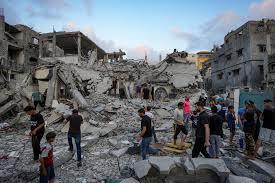
The pace of events and announcements of intent these days seems to be constantly accelerating, leaving us simple citizens of Israel unable to decide where we stand and whether we’re coming or going.
The bombshell of U.S. President Trump’s plan for Gaza may well have become a fait accompli by the time this article appears, so it is risky to make any firm statement about its possible effects and repercussions just now. One thing is clear: the whole world, except for Israel’s government and the U.S. Administration, is united in rejecting the idea. Most vociferous in opposing it are the Arab countries, especially those two (Egypt and Jordan) slated to accept the Gazans who agree to leave that benighted piece of real-estate. So much for Arab solidarity. Not to mention human compassion in the rest of the world.
It’s somehow reminiscent of the worldwide rejection of the idea of taking in the Jews of Germany in the period prior to the outbreak of WWII. But in contrast to the Gazans, those Jews had not attacked civilians and wreaked havoc on peaceful settlements. At that time there was no Israel to take in the hapless refugees. After the proclamation of the State of Israel in 1948 all the Arab countries in which Jews had lived for hundreds if not thousands of years expelled them and seized their property. Only Israel was prepared to take them in, and by now they are an integral part of society. In contrast to those Arab countries which took in Palestinians, Israel did not insist on the newcomers retaining the label of ‘refugees’ on a permanent basis.
There’s no getting away from the fact that the situation is complicated. President Trump can at a stretch be likened to Alexander the Great, who took a drastic measure to solve the issue of the Gordian knot. Finding a bold and original solution to a problem may have been all well and good in the ancient world, but in this day and age it has the effect of putting many people’s back up. So if it takes a megalomaniac real-estate developer to come up with a bold and original solution to a problem what right do we have to criticize?
The parallel with Alexander the Great could be taken even further. Alexander was undoubtedly an original thinker, a military and political genius who was venerated and adored by his troops (until they rebelled when he schlepped them to India). But there have been other leaders in more recent history who have aroused widespread devotion, displayed original thinking and rhetorical power but eventually came to a Bad End that cost many millions of lives.
So all we simple citizens of Israel can do is sit back and watch our leaders cook up ever more fantastical solutions for the problems they have created. Our democratic right to demonstrate, as well as to cast our vote every five years, is still with us, but in the meantime the juggernaut just keeps rolling ahead, crushing everything and everyone in its path.
January 30, 2025
The Struggle Continues
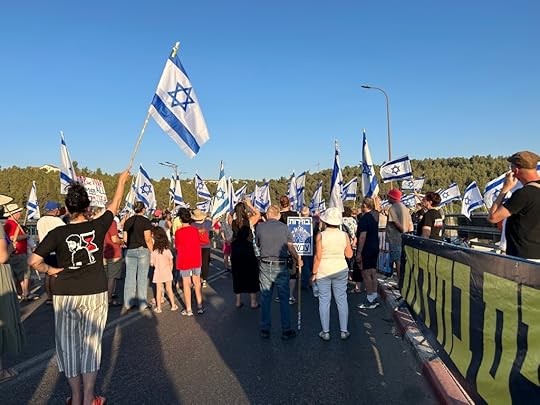
The return of our hostages from the abyss of their captivity in Gaza to the exhilarating reunion with their families enabled most Israelis, as well as Jews and supporters everywhere, to share in their happiness. We sat shedding tears of joy as we watched the events on our television screens.
The sight of the returning inhabitants of Gaza to the remnants of their homes must equally have brought some degree of satisfaction to the supporters of those unfortunate people. Likewise, the release of terrorists from Israel’s prisons undoubtedly brought joy to their friends and supporters. The agreement reached under which these events unfolded has created situations of combined joy and anguish in many hearts, and as we console ourselves with the sight of returning hostages reunited with their families we wonder what kind of future lies ahead for all concerned.
Much of the credit for the agreement must go to US President Trump, the self-declared ‘greatest President America has ever had,’ but also to Israel’s government, which voted in favour of the agreement despite vociferous dissenting voices and even resignations within its ranks.
The agreement is far from perfect, and far from being achieved in full. The declared intent of certain government ministers to create Jewish settlements in Gaza and to resume the war there is still hanging over the resumption of negotiations for the release of additional hostages after the initial phase which concerns only about one third of the hostages.
One of the salient phrases we heard from the hostages who have been released to date is that every effort must be made to release all the remaining hostages. The demonstrations that have been held all over Israel demanding an end to the war and the release of all the hostages are continuing. As a regular participant in these, I am encouraged by hearing the returning hostages speak of the reassurance they received while in captivity from the knowledge that these demonstrations for their return were being held.
When I was on my way to Jerusalem a couple of weeks ago I was stuck in a traffic jam for over an hour as a result of a demonstration being held to protest against the armistice and hostage-release deal. As I sat in my car I could see dozens of schoolboys from religious institutions being brought in by bus and furnished with placards protesting the agreement. I wondered what kind of ‘education’ they were receiving when the Jewish imperative of redeeming captives and caring for our co-religionists was being so blatantly ignored.
I fear for the future of Israel as a liberal democratic society when some of our youngsters are being taught fear and hatred, not only of those who seek to destroy us but also of those within Israel who hold differing political views to theirs.
For better or for worse, the struggle within Israel between those who regard the return of all our hostages as being of paramount importance and those who prefer to see the threat imposed by the release of terrorists as of salient importance continues to overshadow the political and public arena.
January 23, 2025
Coming Home
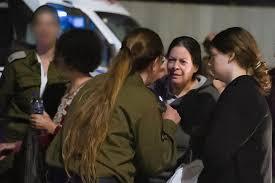
The return of the first three hostages after more than a year in captivity in Gaza was a rare moment of unity in Israel. Like most other people in the country, I was glued to the television screen on the afternoon set for their return and was not sure what I would be witnessing.
The scene of the baying crowd of Gazans surrounding the vehicles bringing the three young women, Emily, Doron and Romy, was like something out of a horror movie. Watching the three figures run the gauntlet of the throng, with heavily armed and masked Hamas fighters supervising their transfer to the Red Cross vehicles, I felt a mixture of anger and fear. I thought I was seeing three frail young women being forced to endure yet another terrifying experience.
After a nerve-wracking interval, the images on the screen eventually shifted to another location where we could see the young women stepping out of the Red Cross vehicles and being welcomed by Israeli soldiers. At last they were able to breathe freely. I think I was not alone in being pleasantly surprised to see them walk confidently towards the waiting soldiers before being taken to the building where each one was due to be reunited with her mother.
These were not fragile, delicate little creatures who had endured hell on earth in the tunnels of Gaza but sturdy, self-assured young women who were free at last. To see the buoyant way they walked alongside the soldiers accompanying them to the meeting with their mothers was inspiring and encouraging. And of course the videos which later emerged showing the moment each one fell into her mother’s arms was heartwarming to an almost unbearable degree. I find it difficult to believe that anyone could have watched that without shedding a tear or two of joy.
Which gives rise to the thought ‘what about their fathers?’ After all, fathers are parents too. And presumably they, too, have emotions of love, concern and yearning to be reunited with their daughter. It seems that, perhaps for practical considerations, someone decided that only one parent could be accommodated in the initial encounter and the helicopter ride to the hospital, where other family members were waiting. The moments of the emotional family reunions which came later were captured by cameras and broadcast to the nation, bringing another surge of joy to all.
The price Israel is paying for the return of the hostages is high and involves the release of many hundreds of terrorists from our prisons. It is undoubtedly a cause for concern and has aroused the opposition of some segments of the coalition government. One party even resigned from the government in protest, while another party voted against it but still saw fit to send a message of welcome to the first three hostages who returned.
The process whereby the remaining hostages will be released remains uncertain, and strong nerves will be required by all concerned in order to ensure that the ceasefire agreement is upheld and negotiations continue until all our hostages, whether dead or alive, are restored to their families or brought for burial in Israel. Many agonizing decisions will have to be made but the mission of repatriating all the hostages is of paramount importance. That is the message that our first three returning hostages have repeated over and over again.
January 12, 2025
Carrying On
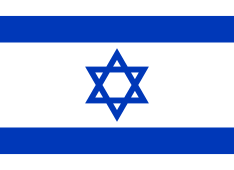
I was stunned when the editor of the small journal issued by the Association of Jewish Refugees in London declined to publish my article about a family reunion which arose from an exhibition accorded to a relative at the Israel Museum. I have been writing a monthly column entitled ‘Letter from Israel’ for that journal for almost twenty years. I was even more stunned by the reason given for rejecting my piece, namely, that it ‘comes across as rather self-indulgent’ and in view of the war in Gaza ‘might antagonise our readers.’
I was in the throes of battling a nasty cold, so it took me a week to recover my senses and pen a reply. This is what I wrote:
‘I’m very disappointed that you have declined to publish the article about my family. I thought it was particularly appropriate for your readers as it refers to the reuniting of a scattered refugee family, and the belated recognition of an exiled artist.
The sense I get from your letter is that you feel that your readers begrudge any glimmer of normality evident in Israel just now. I have always tried to present in my ‘Letter from Israel’ that very-much neglected side of reporting on Israel. Yes, there is a war going on, and every day we swallow the bitter pill of news about another soldier who has fallen in battle and watch on the nightly TV news the heart-wrenching funerals and eulogies for these brave young men.
But normal life does go on. The sun shines and people go about their daily business. Sometimes people in the Tel Aviv and central Israel area are woken by the sound of sirens in the middle of the night and have to go to safe rooms or shelters due to missile attacks from Yemen. Missiles are still being fired into souhern Israel from Gaza. Here in the Jerusalem area we have been less affected by these attacks to date.
I feel that your readers are too much influenced by reports in the biased foreign media. The BBC, for example, refuses to define Hamas as a terrorist organisation. The footage from Gaza is not pleasant to watch, of course, but whatever is happening there is the result of Hamas’ attack on Israel and its avowed intention to do the same again if given the chance. People here are more affected by the fate of our hostages, and the cruel conditions in which they are being held.
Israel’s existence today is the main reason that Jews are not shunted from pillar to post, as they have been in the past. The impression I get from you is that your readers, who have decided not to throw in their lot with Israel — as I have — and prefer to remain in the comfort of the diaspora (the word ‘fleshpots comes to mind) feel justified in criticising Israel for retaliating to the attack by Hamas on innocent civilians.
My focus on the relatively normal aspects of daily life here is not to be taken as any kind of support for the current government, which has twisted and degraded Israel’s founding principles and whose downfall is the aspiration of all right-thinking Israelis.
This, then, is my real ‘Letter from Israel.’
To her credit, the editor reacted promptly and considerately, reversing her decision not to publish my article, and even suggesting an expanded ‘Letter from Israel,’ combining segments from my original article with the letter I sent her. I accepted her suggestion, and look forward to seeing the new version in print as well as on the AJR website. I wonder what kind of reaction it will get.
December 30, 2024
A Family Affair
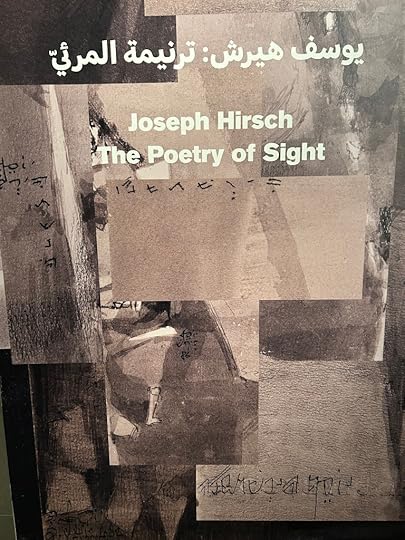
When my parents immigrated to Israel, after my father’s retirement from work in England in 1983, my mother was able at last to be reunited with many of her relatives. Several members of the Hirsch clan (my mother’s maiden name) had managed to move to Israel from Germany, some to work in agriculture others to find employment in other spheres. What had once been a close-knit group of relatives in Germany did their best to remain in contact in their new-old homeland, and so my mother was finally able to meet many of her cousins once again.
That generation is no longer with us, but we of the second generation, the children of those cousins, have endeavoured to stay in touch with one another, whether by physical visits or other means. In this day and age that is easier than ever, and we even have a cousins WhatsApp group which generally gives information about births of grandchildren or other significant events in our lives.
One of my mother’s cousins was Joseph Hirsch, a widely-respected artist and teacher at the Bezalel Academy of Art and Design, who died in 1997. Known as ‘Boujik’ in the family, his talent was evident at an early age and he was able to study art, first in Germany and later at the newly established Bezalel Art Academy in Mandate-controlled Israel. It is worth noting that many members of the Hirsch clan display some kind of artistic bent or talent, and several have even made art a full-time career. My mother was definitely talented artistically, but never took it up seriously, though her handwriting displays definite artistic sensibility, and I myself paint amateurishly in watercolours.
Occasions for gatherings of the cousins are few and far between these days, so it was with great delight that we read the announcement in our WhatsApp group that an exhibition devoted to the work of Joseph Hirsch would be held at the Israel Museum in Jerusalem, and that a reception for friends and relations would be held at the Museum on the morning after the official opening.
The exhibition, entitled ‘Joseph Hirsch, the Poetry of Sight,’ was curated jointly by the Israel Museum’s Ronit Sorek and Avishay Ayal, one of our cousins who is himself an accomplished artist and Professor of Art at Haifa University. The exhibition displays about twenty-five of Hirsch’s works in pen and wash (he worked using only shades of grey) presenting his unique and insightful way of seeing the world, whether depicting sitting or reclining models, still lifes or fantastical creatures and images. It is difficult to categorise his work, which seems to lie on the cusp between surrealism and German expressionism.
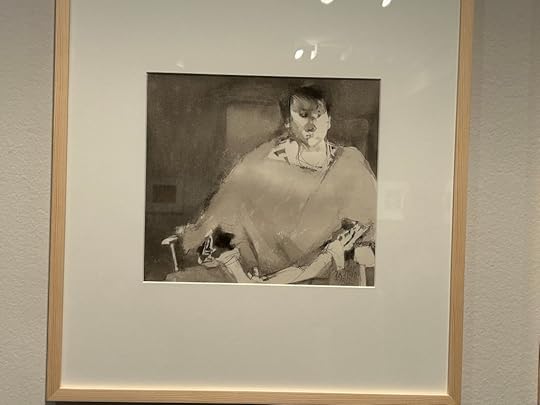
At the reception, arranged by Boujik’s two daughters, we were able to hear speeches by Hirsch’s former colleagues and students describing his teaching approach and analyses of his work. We of the second and third generations were able to drink tea or coffee, renew our contact with one another and catch up on news of our families and activities. Eventually we proceeded to the intimate Hagit Gallery in the wing of the Museum devoted to Israeli art. With music by Bach in the background, we could view the pictures painted in Hirsch’s inimitable style as well as a video in which his former students and colleagues talk about working with him. Altogether, we feel fortunate to belong to a family containing such talented members.
December 20, 2024
La Carte postale
This book written in French by Anne Berest describes the vicissitudes and eventual fate of the various members of the Jewish Rabinowitch family, starting in Russia, then moving to Poland, Lithuania, pre-State Israel and finally France, putting down roots in each place before being forced or feeling impelled to move on.
The postcard of the title is sent to the author’s mother in Paris and bears the names of four members of her family who perished in the Holocaust. Who sent it and why is a mystery. A large part of the book concerns the author’s search, together with her mother, for the source of the postcard and an explanation for its enigmatic content and delivery.
The narrator involves the reader in her search, while at the same time providing long and detailed accounts of life in the various places where family members resided. Thus for example, we learn about farming methods in Israel when it was still under the British Mandate, the life of prosperous Jewish merchants in Lithuania, and Jewish life in rural Poland. The threat of pogroms and persecution is ever-present in the background, but until the Nazi occupation of France and most of Europe the member of the Rabinowitch family manage to survive and even to prosper.
Most of the events described in the book take place in France, whether in Paris or rural Brittany. Particularly telling is the account of the way the German occupiers gradually close in on the Jewish population, depriving them of their rights and property and eventually deporting them in cattle trains to concentration camps in the east, with the cooperation of the French authorities. All those events are described in harrowing detail.
Nonetheless, one member of the Rabinowitch family, Miryam, the mother of the author, manages to survive in a remote French village. While studying at the Sorbonne in Paris Miryam meets and marries a young man, Vicente Picabia, whose parents are artists and are connected with the artistic milieu of Paris at that time.
Despite all the author’s efforts, she is unable to find out who sent the postcard and why. Only at the very end of the novel, seemingly by chance, the origin of the postcard finally comes to light and the mystery is solved. The postcard serves to give continuity to the narrative while at the same time providing the link for the account of the way France cooperated in depriving the Jewish population of its rights and eventually took part in its annihilation.
The book is well-written, and although now and again I had to look up words in the dictionary (Google Translate), I found it an enjoyable read, despite the somewhat horrendous subject-matter. It is important that this topic continues to be written about and discussed, so that the memory of what happened then is not lost in oblivion.
December 11, 2024
Everything, Everywhere, All at Once
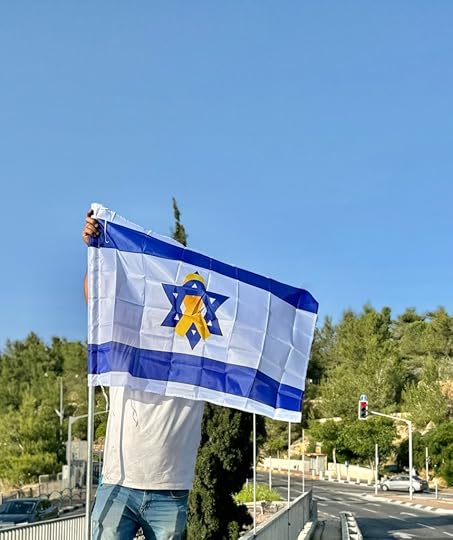
Our minds and hearts still reeling from the events of the last year, starting with the vile attack on kibbutzim and towns in the south by Hamas, the subsequent war in Gaza, political division in Israel and the impending trial for corruption of Prime Minister Netanyahu, when we find our northern neighbour and enemy, Syria, in turmoil as a result of the rebel groups’ overthrow of Assad’s murderous regime.
On top of it all, this year has now officially been declared a drought year, with farmers all over Israel struggling to produce the crops we need. We simple citizens can enjoy the mild winter days, and fortunately there is no shortage of water for our basic needs due to Israel’s innovative desalination programme, but the overall situation is grim and the future is ever more difficult to decipher.
Hamas’s assault on the peaceful communities on the border unleashed a response from Israel that has led to untold suffering for the residents of the Gaza Strip, in the IDF’s attempt to eradicate the ability of Hamas to try to repeat that attack, as is its stated aim. It goes without saying that no normal citizen of Israel rejoices in the suffering of innocent people on any side, but a repeat of the events of last October cannot be allowed to continue to threaten Israel’s civilian population.
The trial of Benyamin Netanyahu has managed to further deepen the political divide in the country, with his supporters waging a war of animosity against his detractors. Bibi himself has not been backward in coming forward with statements denigrating the ‘hostile’ media and the ‘less than impartial’ legal system, with special antagonism reserved for the Attorney General, who stands alone as the last bastion supporting the rule of law in Israel.
Particularly upsetting for me is the hostility reserved by supporters of Netanyahu for the families of the hostages held by Hamas in inhumane conditions in the tunnels under Gaza. Together with a couple of hundred other inhabitants of Mevasseret Zion and its environs just outside Jerusalem I stand on the bridge over the main highway from Jerusalem to Tel Aviv to demonstrate for the return of the hostages every Saturday night. We stand with our flags and are addressed briefly by representatives of various groups before the names of all the hostages are read out and we call for their return.
Last week we were addressed by a representative of one of the groups that had worked tirelessly to restore some semblance of order to the ravaged south of Israel after the seventh of October. The speaker, who was originally from a religious kibbutz, said that the aims and actions of the party purporting to represent Religious Zionism are not in accordance with the ideals of the religious Zionism on which he was educated. As a former member of Bnei Akiva, that certainly chimes with my own understanding of what religious Zionism is and should be.
With turmoil on Israel’s northern border, war in the south, unrest in the West Bank and far-reaching internal divisions it seems callous to continue living in relative comfort and enjoying the sunshine, but that is all we can do as the tempest rages around us.
December 3, 2024
Maybe it’s Because I’m a Londoner…

Spending a week in London in mid-November is not really a good idea for someone who has become used to the Mediterranean climate of Israel, even a born-and-bred Londoner like me, but the arrival there of our son from Las Vegas proved an overriding attraction, so we went.
The weather when we got there was positively arctic, something which even native Londoners find difficult, but luckily the arctic blast passed after a couple of days, and the rest of our time there we were able to enjoy blue skies and relatively kind weather. And in typical British fashion, our principal concern was the weather.
Apart from coping with the climate, our time in London was spent in meeting old friends, as well as in sharing our love for art with our son and his children (who. like us, flew over from Israel to meet him). Thus, we were able to enjoy several meals in the local pub and the nearby Chinese restaurant en famille, as well as avoiding the long queue for the National Gallery by seeking refuge in the delightful Wallace Collection just off Oxford Street.
As is our tradition in London, we managed to see a play. This time it was ‘The Lehman Trilogy,’ performed at the relatively new Gillian Lynn Theatre. Three male actors portrayed the three brothers, immigrants from Germany, who founded the firm first in pre-Civil War Alabama and later in New York. With time they branched out from trading in raw cotton to coffee and other commodities and eventually to finance and banking. In the end, after selling the firm to outsiders, it collapsed into bankruptcy. The fate of the Lehman Brothers financial enterprise in the financial crisis of 2008 is a well-known event, and the attempt to dramatise it using just three actors provides an admirable vehicle for their respective thespian abilities. However, the exposition, though enhanced by splendid visual effects and scene changes, was too long and eventually verged on the boring, in my opinion. Particularly interesting for me was the use of Hebrew prayers (in the Ashkenazi pronunciation I remember from my own home) and the live piano accompaniment, consisting of many familiar Hebrew tunes. The theatre was packed and the audience gave the actors a well-deserved standing ovation at the end.
We were also able to attend a performance of piano duets given by two young pianists, one originally from Israel the other from Hungary, in a small art gallery tucked away behind Picadilly Circus. We sat together with a small, select audience, surrounded by enormous Baroque-era paintings hung on walls clothed in green silk while the two young men played an astounding arrangement for four hands by Max Reger of Bach’s first Brandenburg concerto, as well as more well-known duets by Schubert and Schuman. The event ended with the two brilliant pianists helping to push the grand piano aside so that champagne could be served to all those present. Truly an inspiring evening.
Getting around in London requires a fair amount of walking on hard pavements and through underground stations. A week of activities in London is not for the faint of heart or weak of legs. We loved every minute of our stay even though our return journey involved a long drive to the airport and an overnight flight back to Israel. Dawn was breaking over the Judean hills as we returned to Jerusalem, and we were glad to be back in our comfortable home once more.
November 20, 2024
Our House of Representatives
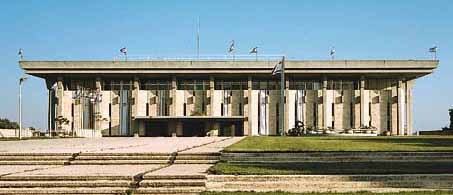
Because I have been living in Israel for a long time and have managed to be in the right place at the right time, I happen to have been present at the official inauguration of some of Israel’s major institutions and architectural gems. These include: the Israel Museum (Jerusalem, May 1965), as my uncle and aunt who were the official recipients gave me their invitation and flew off on their travels abroad; the Knesset building (Jerusalem, August 1966), and the Supreme Court building (Jerusalem, November 1992), the last two due to my late father’s association with the Rothschild Foundation. All the ceremonies consisted maiinly of speeches in Hebrew by various dignitaries and which were largely incomprehensible to me at the time, followed by drinks and canapés of various kinds. Because of my linguistic limitations I was unable to benefit from mingling with the cream of Israel’s cultural, political and legal elites at the time, and limited myself to enjoying the food and drink.
Later on, in my career as a free-lance translator, I found myself involved in the translation of five of the six volumes of Major Knesset Debates, 1948–1981, edited by former Clerk of the Knesset, Netanel Lorch. This project, which occupied me for several years, gave me a unique insight into the workings of the Knesset and the nature of the debates held there as well as of the various individuals (i.e., politicians) who participated in those debates.
Most of those individuals are no longer alive, and are considered by now to have been among the movers and shakers who established Israel as an independent state and moulded its character. Whether their legacy of relatively civilized debate and high-minded consideration of the issues confronting the nascent State has endured is debatable. Most of the speakers whose words I had the privilege of converting into the English language were men (and a few women) of intelligence, honesty, sincerity and integrity whose principal concern was to preserve the ideals and values which formed the basis of Israel’s existence.
There were undoubted differences between them on political and ideological grounds, but they almost always sought to express them in terms that were devoid of censure and vituperation. Thus, for example, in the debate held on 8th March 1949 on the formation of the cabinet and its programme, Uri Zvi Greenberg, representing Herut, said that while he would have liked to be able “to regard the House as the supreme legislature of the nation,” he regretted the fact that some of the speakers seemed merely to be repeating internal squabbles that had been prevalent in the days of the Mandate. Prime Minister David Ben-Gurion concluded the debate by saying “I would like to express my satisfaction – and I think we all share that feeling – at the way the members of the Knesset conducted the debate during these three days, and at the patience and mutual respect displayed by everyone… We heard the Arab delegates, Amin Jarjoura and Tewfik Toubi. Whether we agree with everything they said or not, we are proud that this is the manner in which we communicate.”
The fact that all the debates of the Knesset were conducted in Hebrew, the ancient language that had only recently been revived, is also worth noting. Altogether, the establishment of the State of Israel, the first Jewish state for two thousand years, is an event that we take for granted today but represents a milestone in the life of the nation.
The direction in which the political leadership is taking the country today, with debates in the Knesset that reflect the paucity of intellect and inferior level of expression of the participants, does not augur well for the future of the country and betrays the high ideals and concerns of our founding fathers.



